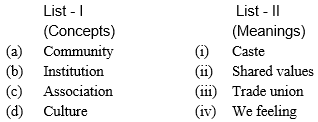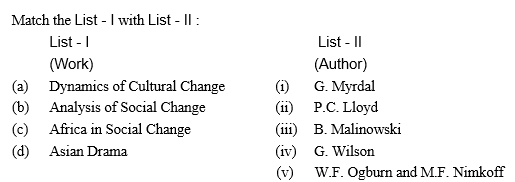- (1) Karl Marx
- (2) Emile Durkheim
- (3) Auguste Comte
- (4) Max Weber
Answer: Option (2)
- (1) R.M. Mac Iver and C.H. Page
- (2) Kimball Young and W.F. Ogburn
- (3) Henary Jonhan
- (4) Kingsley Davis
Answer: Option (1)
- (1) Coser
- (2) Dahrendorf
- (3) Collins
- (4) Marx
Answer: Option (2)
- (1) Mores
- (2) Folk ways
- (3) Norms
- (4) Sanctions
Answer: Option (4)

- (1) (ii) (i) (iv) (iii)
- (2) (iii) (ii) (i) (iv)
- (3) (iv) (i) (iii) (ii)
- (4) (i) (iv) (ii) (iii)
Answer: Option (3)
- (1) R. Linton
- (2) Henry Maine
- (3) R.K. Merton
- (4) S.F. Nadel
Answer: Option (2)
- (1) Ralph Linton
- (2) Max Weber
- (3) S.F. Nadel
- (4) A.K. Rossi
Answer: Option (2)
- (1) A.R. Radcliffe - Brown
- (2) S.F. Nadel
- (3) G.P. Murdock
- (4) C. Levi - Strauss
Answer: Option (2)

- (1) (ii) (i) (iv) (iii)
- (2) (i) (iii) (iv) (ii)
- (3) (ii) (iii) (iv) (i)
- (4) (i) (ii) (iii) (iv)
Answer: Option (1)
- (1) James Frazer
- (2) Emile Durkheim
- (3) A.R. Radcliffe - Brown
- (4) B. Malinowski
Answer: Option (2)
Assertion (A) : Endogamy is still prevalent in Indian Society.
Reason (R) : Mostly people prefer marriage within their own caste.
Select the correct answer from the code given below :- (1) Both (A) and (R) are true and (R) is the correct explanation of (A).
- (2) Both (A) and (R) are true, but (R) is not the correct explanation of (A).
- (3) (A) is true, but (R) is false.
- (4) (A) is false, but (R) is true.
Answer: Option (1)
- (1) Weber
- (2) Smelser
- (3) Parsons
- (4) Merton
Answer: Option (2)
- (1) Acculturation
- (2) Cultural diffusion
- (3) Enculturation
- (4) All the above
Answer: Option (3)
- (1) Andre Beteille
- (2) Yogendra Singh
- (3) Dipankar Gupta
- (4) M.S.A. Rao
Answer: Option (2)
(a) A pre-requisite for any society
(b) Essential to any social life
(c) Cultural and social reproduction of social forms
(d) Diffusion of culture
Mark the correct answer from the code given below :- (1) (a), (b), (c)
- (2) (b), (c), (d)
- (3) (c), (d), (a)
- (4) (d), (a), (b)
Answer: Option (1)
- (1) Marx
- (2) Freud
- (3) Piaget
- (4) Cooley
Answer: Option (3)
- (1) Piaget
- (2) Freud
- (3) Durkheim
- (4) Mead
Answer: Option (2)
- (1) Social hierarchy
- (2) Social mobility
- (3) Upward mobility
- (4) Downward mobility
Answer: Option (2)
- (1) Davis
- (2) Marx
- (3) Moore
- (4) Weber
Answer: Option (4)
- (1) Marx
- (2) Davis and Moore
- (3) Weber
- (4) Bendix and Lipset
Answer: Option (2)
- (1) E. Kant
- (2) K. Marx
- (3) G.W.F. Hegal
- (4) F. Engels
Answer: Option (2)

- (1) (iii) (iv) (ii) (i)
- (2) (i) (iii) (iv) (ii)
- (3) (iv) (iii) (ii) (i)
- (4) (ii) (iii) (i) (v)
Answer: Option (1)
- (1) Structuralism
- (2) Functionalism
- (3) Structural - differentiation
- (4) Structural - Functionalism
Answer: Option (4)

- (1) (i) (ii) (iii) (iv)
- (2) (iv) (ii) (i) (iii)
- (3) (ii) (iii) (iv) (i)
- (4) (iv) (i) (ii) (iii)
Answer: Option (4)
- (1) A.R. Radcliffe - Brown
- (2) S.F. Nadel
- (3) C. Levi - Strauss
- (4) Talcott Parsons
Answer: Option (3)
- (1) E. Durkheim
- (2) A.R. Radcliffe - Brown
- (3) B. Malinowski
- (4) F. Boaz
Answer: Option (2)
- (1) Malinowski speaks of function primarily in terms of physiological and psychological needs
- (2) Malinowski cannot be described as functionalist because he became obsessed with empirical reality
- (3) Malinowski continues to be a powerful influence in Anthropology
- (4) Malinowski is constantly present in meticulously carried out field research
Answer: Option (2)
- (1) Relative Similarity
- (2) Relative Dissimilarity
- (3) Relative Deprivation
- (4) Relative Complexity
Answer: Option (3)
- (1) Functional analysis
- (2) Study of normative behaviour
- (3) Structural formulations
- (4) Conjecture and guess
Answer: Option (1)
- (1) Homeostasis
- (2) Manifest functions
- (3) Darwin’s principles
- (4) Physical Laws
Answer: Option (1)
- (1) Value Bias
- (2) Value Judgement
- (3) Value Relevance
- (4) Value Freedom
Answer: Option (3)
- (1) Self Perception
- (2) Generalized Other
- (3) Social Act
- (4) Sensuous Stimulation
Answer: Option (2)
- (1) Human beings, unlike lower animals, are endowed with the capacity for thought.
- (2) The capacity for thought is shaped by social interaction.
- (3) Meanings and symbols allow people to carry on distinctly human action and interaction.
- (4) People are not able to make any modifications and changes during interactions.
Answer: Option (4)
- (1) C.H. Mead
- (2) G. Mosca
- (3) C.W. Mills
- (4) V. Pareto
Answer: Option (4)
(a) Productive Activity
(b) Fellow Workers
(c) Product
(d) Own Species Being
(e) Family Members
- (1) (a), (b), (c), (e)
- (2) (a), (d), (e)
- (3) (b), (c), (d)
- (4) (a), (b), (c), (d)
Answer: Option (4)
- (1) K. Marx
- (2) L.A. Coser
- (3) R. Collins
- (4) S.F. Nadel
Answer: Option (3)
- (1) Quasi, Interest, Conflict
- (2) Quasi, Intermediate,Conflict
- (3) Interest, Latent, Manifest
- (4) Conflict, Consensus,Quasi
Answer: Option (1)
- (1) Jeffrey Alexander
- (2) Lewis A. Coser
- (3) Randall Collins
- (4) Ralf Dahrendorf
Answer: Option (2)
- (1) Weber
- (2) Comte
- (3) Durkheim
- (4) Radcliffe - Brown
Answer: Option (3)
(a) Accounts for external world
(b) Accounts for internal world
(c) Represent the world as it exists
(d) Independent of our conceptions
Select the correct answer from the code given below :- (1) (a), (b), (c)
- (2) (b), (c), (d)
- (3) (b), (a), (d)
- (4) (a), (c), (d)
Answer: Option (4)

- (1) (i) (ii) (iii) (iv)
- (2) (ii) (iii) (iv) (i)
- (3) (iii) (i) (iv) (ii)
- (4) (iv) (ii) (i) (iii)
Answer: Option (4)
- (1) Weber
- (2) Dilthey
- (3) Carr - Saunders
- (4) Rickert
Answer: Option (2)
- (1) Cohort study
- (2) Trend study
- (3) Cross sectional study
- (4) Longitudinal study
Answer: Option (3)
- (1) The researcher must pretest the subject
- (2) The researcher must conduct pilot study
- (3) At least 100 respondents must be selected from a given population
- (4) Every member of the population must have an equal chance of being selected
Answer: Option (4)
- (1) B. Malinowski
- (2) E. Durkheim
- (3) William F. Whyte
- (4) N. Anderson
Answer: Option (3)
- (1) Yules ‘Q’
- (2) Phi coefficient ‘φ’
- (3) Rank correlation ‘r’
- (4) Chi-square (χ2)
Answer: Option (4)
- (1) Normal reliability
- (2) Alternate form reliability
- (3) Test - retest reliability
- (4) Split half reliabilizty
Answer: Option (3)
- (1) It is thought to measure what it sets out to measure
- (2) Observations have produced required data
- (3) The quality of data is good
- (4) It is thought to measure the unplanned facts
Answer: Option (1)
- (1) Mean
- (2) Median
- (3) Mode
- (4) None of the above
Answer: Option (3)
- (1) Quite common in social science research
- (2) Rare but possible in social research
- (3) Impossible in social science research
- (4) The easiest one in social research
Answer: Option (2)
